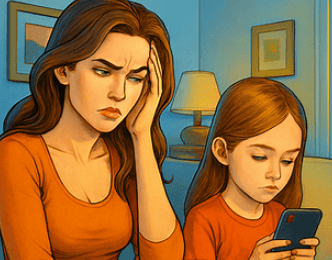[NSW] Break your Child Screen Addiction
By NSW Principal – MR TONY HANLON

For many families, screen time can be more accurately described as ‘scream’ time. Our addiction to devices is leading to more arguments as we try to get our children to put down their devices. Unfortunately, we are all becoming more addicted to screens at the expense of our health and ability to engage with other people and the world around us.
One of the most concerning effects of prolonged screen exposure is its impact on mental health. Studies have linked excessive screen time – especially on social media platforms – to increased rates of anxiety and depression. It can even affect our children’s abilities to make new friends. The constant barrage of notifications, comparisons, and digital noise can overwhelm the brain’s reward system, leading to emotional fatigue and reduced self-esteem.
Children and teens are particularly vulnerable. Research shows that heavy screen use can impair emotional regulation, reduce attention span, and even alter brain development. In adults, it can contribute to burnout, irritability, and difficulty concentrating. Recent studies from Denmark* reveal alarming trends, including higher blood pressure, cholesterol, and insulin resistance with each extra hour of screen time children and teens spend online. (*published in the Journal of the American Heart Association)
Too much screen time is proven to cause
- sight problems,
- sleep disruption,
- obesity, and
- increased risk of anxiety & depression.
Strategies to Break the Addiction
- Create screen-free zones: Keep devices out of bedrooms and off the dinner table.
- Put a password on all devices that your child doesn’t know.
- Homework should be done on the computer located in a central part of the home so that you can monitor usage.
- Model healthy habits – children learn by example.
- Prioritise movement – encourage outdoor play, regular exercise, and active breaks during work.
So how can we reduce our addiction?
Firstly, as with all addictions, we need to admit we have a problem. A quick survey of your family on an average Saturday night at home will give you a good indication. Say it is 7 pm – what is each family member doing? If the answer is that everyone is on a screen, then it’s time to take action.

The bullet points below are some ‘quick fixes’ to get your family into healthier digital habits!
- How much homework and school projects actually require the use of the computer? – request to see the actual homework assignment sheet or project notification so you can judge how much online/computer time is actually needed.
- The device used for homework should be located in the family living or dining room so that you can readily monitor how it is being used.
- Create screen-free zones. Keep devices out of bedrooms and off the dinner table.
- Get your child to handwrite a draft of their homework or assignment where possible. Another family member might even be able to type up the actual homework for them to further reduce your child’s screen time.
- Put a password on devices that your child doesn’t know – they won’t be able to use the device unless you unlock it.
- Don’t be afraid to say no. Sometimes we can’t be our child’s friend – we have to be their parent.
- Use a distraction strategy. Depending on the age of your child encourage another activity for their free time such as Lego, a family activity such as Scrabble or Monopoly.
- Teach your child chess, checkers, card games, etc. – let them see there are other ways to entertain themselves.
- Get them to read more – set a minimum number of pages to be read every night/week and provide a reward if the weekly target is met.
- Provide some ‘approved free-use time’ when it is okay to use devices for entertainment; however, set a weekly limit. Once the limit is reached, no more screen time for that week. There are ‘apps’ available that can monitor screen time usage.
- Set a good example by limiting the time you spend on devices when they are around. Have books or cards, etc in the car to encourage them to do something other than screentime when in the car.
- Model healthy habits: Children learn by example – adults who unplug inspire kids to do the same.
- Prioritise movement: Encourage outdoor play, regular exercise, and active breaks during work.
More time away from our screens leads to a happier and healthier life for all our families. Our devices are there to assist and liberate us, to maximise our free time. It is up to us to go out and live life in 3D – not through a screen.






